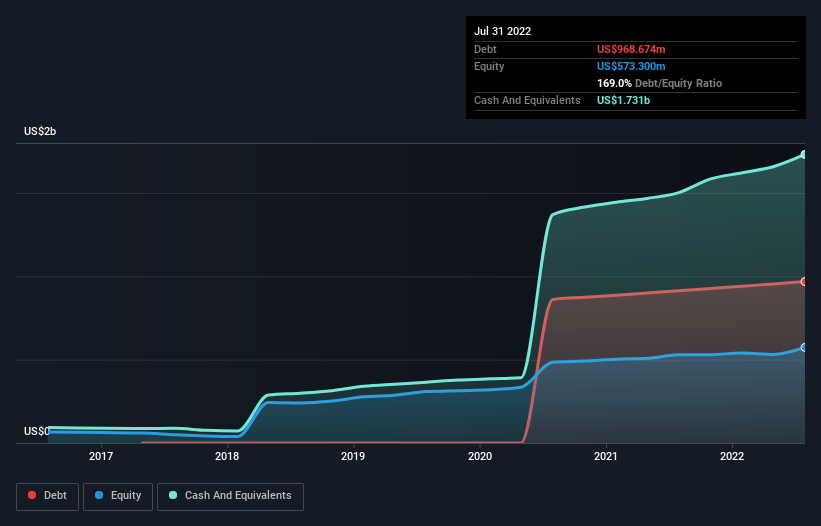
The external fund manager backed by Berkshire Hathaway's Charlie Munger, Li Lu, makes no bones about it when he says 'The biggest investment risk is not the volatility of prices, but whether you will suffer a permanent loss of capital.' So it might be obvious that you need to consider debt, when you think about how risky any given stock is, because too much debt can sink a company. Importantly, Zscaler, Inc. (NASDAQ:ZS) does carry debt. But should shareholders be worried about its use of debt?
When Is Debt Dangerous?
Debt is a tool to help businesses grow, but if a business is incapable of paying off its lenders, then it exists at their mercy. If things get really bad, the lenders can take control of the business. While that is not too common, we often do see indebted companies permanently diluting shareholders because lenders force them to raise capital at a distressed price. Having said that, the most common situation is where a company manages its debt reasonably well - and to its own advantage. When we examine debt levels, we first consider both cash and debt levels, together.
See our latest analysis for Zscaler
What Is Zscaler's Net Debt?
The image below, which you can click on for greater detail, shows that at July 2022 Zscaler had debt of US$968.7m, up from US$913.5m in one year. However, it does have US$1.73b in cash offsetting this, leading to net cash of US$762.7m.

A Look At Zscaler's Liabilities
Zooming in on the latest balance sheet data, we can see that Zscaler had liabilities of US$1.13b due within 12 months and liabilities of US$1.12b due beyond that. Offsetting this, it had US$1.73b in cash and US$401.0m in receivables that were due within 12 months. So its liabilities total US$127.0m more than the combination of its cash and short-term receivables.
Having regard to Zscaler's size, it seems that its liquid assets are well balanced with its total liabilities. So it's very unlikely that the US$26.2b company is short on cash, but still worth keeping an eye on the balance sheet. While it does have liabilities worth noting, Zscaler also has more cash than debt, so we're pretty confident it can manage its debt safely. There's no doubt that we learn most about debt from the balance sheet. But it is future earnings, more than anything, that will determine Zscaler's ability to maintain a healthy balance sheet going forward. So if you want to see what the professionals think, you might find this free report on analyst profit forecasts to be interesting.
Over 12 months, Zscaler reported revenue of US$1.1b, which is a gain of 62%, although it did not report any earnings before interest and tax. Shareholders probably have their fingers crossed that it can grow its way to profits.
So How Risky Is Zscaler?
While Zscaler lost money on an earnings before interest and tax (EBIT) level, it actually generated positive free cash flow US$231m. So taking that on face value, and considering the net cash situation, we don't think that the stock is too risky in the near term. One positive is that Zscaler is growing revenue apace, which makes it easier to sell a growth story and raise capital if need be. But that doesn't change our opinion that the stock is risky. There's no doubt that we learn most about debt from the balance sheet. But ultimately, every company can contain risks that exist outside of the balance sheet. We've identified 3 warning signs with Zscaler , and understanding them should be part of your investment process.
If you're interested in investing in businesses that can grow profits without the burden of debt, then check out this free list of growing businesses that have net cash on the balance sheet.
Valuation is complex, but we're here to simplify it.
Discover if Zscaler might be undervalued or overvalued with our detailed analysis, featuring fair value estimates, potential risks, dividends, insider trades, and its financial condition.
Access Free AnalysisHave feedback on this article? Concerned about the content? Get in touch with us directly. Alternatively, email editorial-team (at) simplywallst.com.
This article by Simply Wall St is general in nature. We provide commentary based on historical data and analyst forecasts only using an unbiased methodology and our articles are not intended to be financial advice. It does not constitute a recommendation to buy or sell any stock, and does not take account of your objectives, or your financial situation. We aim to bring you long-term focused analysis driven by fundamental data. Note that our analysis may not factor in the latest price-sensitive company announcements or qualitative material. Simply Wall St has no position in any stocks mentioned.
About NasdaqGS:ZS
High growth potential with excellent balance sheet.
Similar Companies
Market Insights
Community Narratives



